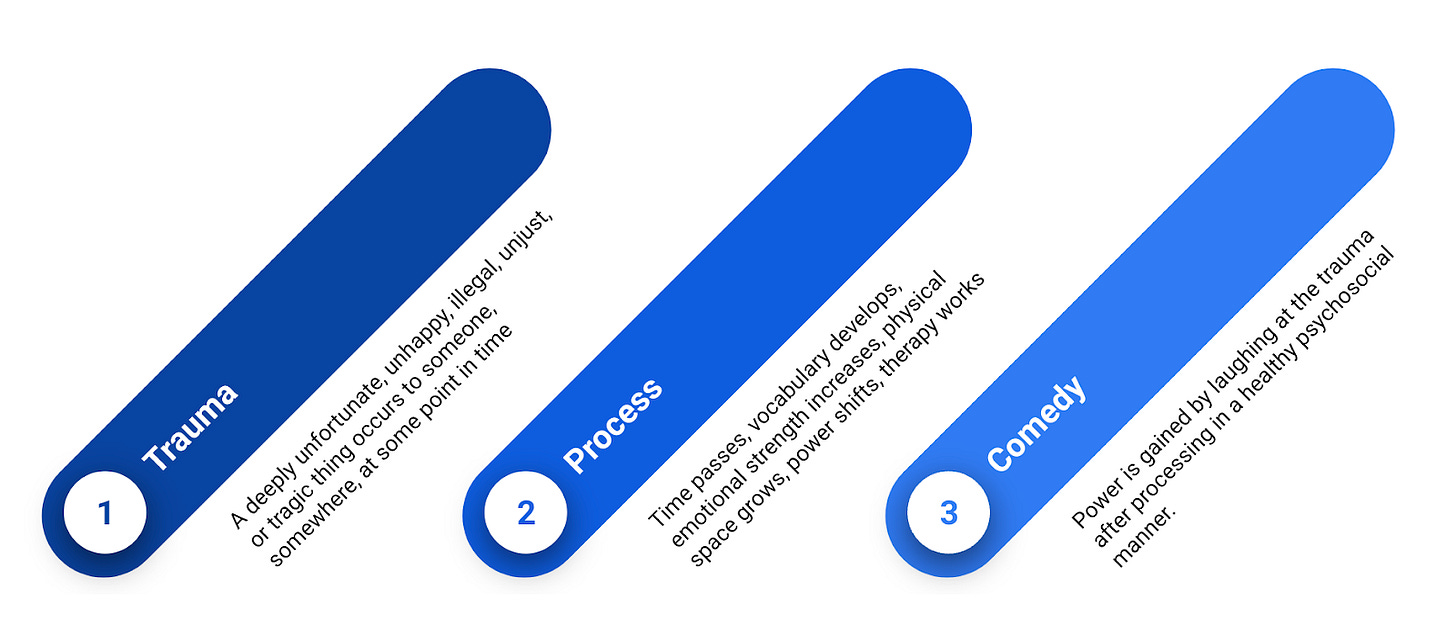Organizational culture is optimizing for Life-Work Rebalancing in the “post-pan” paradigm shift.
Extended social isolation led to introspection which emphasized the importance of mental health. In the past two years, systems were stressed and cortisol levels spiked, with society displaying symptoms of a population undergoing a low-grade traumatic event.
Philosopher Thomas Hobbes wrote that laughter is “a sudden glory, arising from sudden conception of some eminency in ourselves, by comparison with the infirmity of others, or with our own formerly”.
My interpretation: we laugh when we are good, when others are not, or at our previous (not good) selves.
Mark Twain might have been expounding on “our former” selves when he reportedly said: “Humor is tragedy plus time.”
Generation Zoom will need its wits to deal with multiple gray rhinos.
Authenticity is a valuable currency. A relatable sense of humor can convey vulnerability and impart more trust. Office humor is a genre of comedy blessed by Human Resources (or which raises their blood pressure).
As an aficionado of stand-up comedy, I have a deep appreciation for joke construction in the workplace. When smart knowledge workers in the service economy are faced with daily absurdities and inanities of process-oriented systems and entropy of human collaboration, colleagues develop coping mechanisms in the form of office humor.
The targets of humor reflect organizational power dynamics, cultural tolerance, and tacit permission. The punchline can reveal general self-awareness (or lack thereof).
For the Napster Generation, Office Space (1999) was a gift: two decades of wondering out loud - to nobody in particular - WTF “PC Load Letter” actually means and hoping you and your stapler didn’t get moved to the basement. Unfortunately, the same tragicomic genius also captured the current state of Idiocracy (2006).
A leadership culture that can laugh at itself, its environment, and failed experiments is a team with a healthy relationship to power and likely experiencing productive friction, camaraderie, and healthy competition.
I value maintaining a sense of humor in the workplace because I believe laughter comes from a place of psychological safety and is a critical indicator of organizational health.
In a team retrospective, I try to measure culture by two vibes: Joyful and Ruthless.
The value of Joyful should not be provocative. Joy is not currently always baked into our design pattern which is optimized to forgive user error. Provocatively, in urban planning and sustainable infrastructure, the acceptance criteria for a constituent to be “joyful” should be when they are not in a car. Joy is a good thing and we should want more of it. If the team does not feel joy, it will struggle just that much harder to deliver delightful experiences for users, or colleagues, or the market. This could be table stakes for a product-led growth culture.
The value of Ruthless has deep reasons. The etymological root is not the Biblical Ruth. Rather, it’s derived from Old English “rue”, meaning to pity or lament. To have less rue is good and a complete absence of rue is better. The team is clear on vision, priorities, conflicts, responsibilities, expected outcomes, risks, and issues. The team is focused on getting the most juice for the budgeted amount of squeeze. Ruthless implies a vacuum of rue. There are no bitter regrets.
Regrets are personal and shared along with ambitions at specific times, in specific venues.
For Life-Work Balance of the Zoom Generation, authenticity - or lack thereof - when collaborating closely with the 3-5 people each day, week, and month can impact the mood, worldview, and sense of humor of colleagues. Laughter can be a magnet for attention and positive energy, mitigating dismay and shame (frankly, this might explain a lot of stand-up comedians!)
As an extroverted introvert, I primarily extract value from the office environment by engaging with colleagues over extended coffee, lunch chats, and happy hour discussions.
In the digitally-distributed gemba, I have found it valuable to recreate a venue which enables both parties to arrive at a place of psychological safety, with long, winding, agenda-less coffee chats, working lunches, or beer hours.
The output of the comedy writer’s room is an attempt to leverage institutionalized knowledge and hone the premise, set-up, and punchlines which humanize the absurdities of our lived experience.
In my personal experience, meaningful 1:1s with this same type of output can be a functional escape valve to gain perspective over the-powers-that-be which steer our attention. Satirization can be an act of strong followership. Laughter can be a sign of strong leadership.
Everyone should point and laugh at behaviors of individuals and groups which result in losses to themselves and others, because they are justifiably stupid.
I propose that an intelligent leadership culture do the right thing and normalize the practice of periodically seeking out peers, direct reports, and other managers across the organizational tree to engage in creative brainstorming of Joyful and Ruthless verbal memes.
The business objective is to deconstruct power dynamics, satirize absurd norms, and foment more self-awareness amongst colleagues. Everyone should be in on the joke.
Once HR signs-off on the plan, of course.





